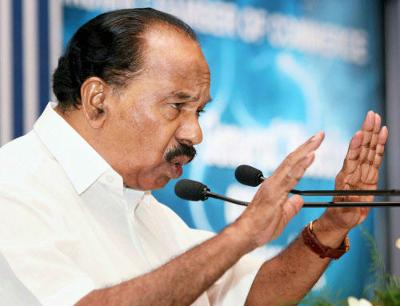 New Delhi, Oct 29: Petroleum Minister Veerappa Moily has decided to take away five gas discoveries from Reliance Industries in the KG-D6 block for its failure to meet timeline, but allowed it to retain three other finds. The move comes in the wake of allegations that Reliance Industries benefited during his regime.
New Delhi, Oct 29: Petroleum Minister Veerappa Moily has decided to take away five gas discoveries from Reliance Industries in the KG-D6 block for its failure to meet timeline, but allowed it to retain three other finds. The move comes in the wake of allegations that Reliance Industries benefited during his regime.
The five discoveries – D4, D7, D8, D16 and D23 – have a reserve of 0.805 trillion cubic feet or about one-fourth of restated reserves in the currently producing Dhirubhai-1 and 3 fields in the KG-D6 block. They are worth $10 billion.
In a prompt response, Communist Party of India’s Gurudas Dasgupta, who has been vociferously demanding cancellation of RIL’s contract, said Moily’s announcement “was a mere show of some action by the government.”
“They only want to show that they are doing something, but actually are not taking any action against RIL. They are cheating the people of the country, who will eventually have to pay the price for the gas sold by the company,” he told Deccan Herald. He objected to RIL retaining the D29, D30 and D31 discoveries.
Incidentally, the Directorate General of Hydrocarbons (DGH) wanted 1,130 sq km to be taken away from RIL on the ground that the timeline to develop the fields had lapsed.
RIL and its partner, British Petroleum (BP), had made a detailed presentation last month to Moily, Oil Secretary Vivek Rae and DGH Director-General R N Choubey. Denying deviation from the production sharing contract, they claimed to have the right to retain the 1,130-sq km area.
For the three finds covering 316 sq km, Moily agreed with RIL-BP that the DGH did not insist on a drill stem test (DST) for confirmation of a discovery in the past. He instead said there was a delay on the DGH’s part in reviewing them though RIL had submitted a declaration of commerciality for the three finds on time.





Comments
Add new comment